Immortality: The Billionaire's Fool's Errand
A Billionaire's Guide to Cheating Death and an Ancient King's Guide to Living
Slick, I won’t interrupt your reading with obnoxious buttons. If you’d like to support me, you’ll find options here:
Hey, Slick!
If I had a pill that could make you immortal… Would you take it?
It’s the ultimate gamble: win eternal life—or lose everything that makes life worth living.
I think the correct answer is no; living forever sounds more like a curse than a blessing. But if I were you I would still take the pill—and sell it to someone dumb enough to actually consume it.
And trust me, Slick; there are plenty of takers—and they’re loaded with cash, big dreams, and a stubborn belief that death is just another problem to solve.
In this world, nothing can be said to be certain, except death and taxes.
-Benjamin Franklin
They’ve already proven Benjamin Franklin half wrong and, as if to add insult to injury, they won’t stop there. After showing it is, in fact, very possible to dodge taxes, billionaires are trying to cheat death.
Because dodging taxes, as brave and defiant as it is, creates a whole new problem: a lifetime wouldn’t be enough to spend all that cash. The only solution? Eternal life. Maybe there’s another explanation; maybe billionaires believe in life after death, and are rightfully concerned where they’ll end up if they face divine justice.

Well, I have good and bad news, Slick.
The good news is that you won’t have to suffer these idiots for eternity.
The bad news is that we’re all going to die.
Doomed from the Start
The quest for eternal life is bound to fail. If climate change, nuclear war, asteroids or aliens don’t get us by then, in a few billion years the Sun will explode. And if that doesn’t do it, the universe will come to an end. On a cosmic scale, death is inevitable.
Big Crunch Energy
Our beloved universe may go with a Big Crunch, a Big Freeze, a Big Rip, a Big Bounce. It could also be something else entirely; most likely a cosmic Big Bunny will inadvertently eat it.
It doesn’t matter. As the Romans used to say,
mors certa, vita incerta.
Death is certain, but its timing uncertain. We know it will happen; we just don’t know how and when.
It doesn’t matter how, it will end: the universe itself is a ticking time bomb.
Still—if they think creatively, maybe with billions of years they will find it possible to spend their billions of dollars. As of this writing, Elon Musk, spending a million a year, would need to live only 416,000 more years to do it, provided he doesn’t make any money in the meantime and doesn’t have a secret little stash somewhere. That’s a long time before the universe implodes or the Big Bunny comes.
The Eternal Quest
To their credit, billionaires didn’t invent anything here. Ironically, the oldest story we have on record is… a cautionary tale about the quest for immortality.
This letter could have been written in 2100 BC.
Sure, at the time, the talk wasn’t about cryogenics or gene editing. But among the ancient writings that survived from ancient Sumer to our day, there are mostly tax records (can’t make this up)… and the Epic of Gilgamesh.
Don’t be like Gilgamesh…
One of our oldest stories is that of a great king who embarks on a quest for immortality, only to discover its impossibility: the gods deny him eternal life.
Not out of cruelty, but to teach him the wisdom of living fully in the time he has.
Thanks to Gilgamesh’s eventual reckoning, we can skip the whole searching-for-eternal-life thing, and just accept our mortality. We will die, and we should make the most of the days we are given to live, however many or few there are.
End of the story.
Except…
Well, except the story never ends. Immortality doesn’t cease to renew itself. Since Gilgamesh, it has given us many more tales, where mortals who dare to defy death learn too late that eternity is no place for a human heart.
Don’t be like Tithonus…
Let’s start with a Greek myth: Tithonus. Unlike Gilgamesh, Tithonus is granted immortality. But there’s a catch.
Eternal life, without eternal youth, ain’t that fun. Tithonus wastes away into a husk, and ends up begging for death.
Be like Eurystheus
The myth of Heracles has better survived the ages. His Eleventh Labor also has to do with immortality, in particular with the golden apples he is to retrieve from the Garden of the Hesperides.
Of course, they’re fiercely guarded, and to succeed Heracles strikes a bargain with the titan Atlas, then tricks him out of the apples and bring them, heroically, to King Eurystheus.
But the king in his wisdom realizes immortality is divine; it doesn’t belong to the realm of mortals. So he gives the apples to Athena, who brings them back to the garden. And just like with Gilgamesh, everyone forgets about the whole story.
What a fool, you might think: King Eurystheus could have made so much cash if he ate just one apples and lived long enough to sell the rest to billionaires…
But who knows? Maybe immortality isn’t that fun.
Scenic Route to Hell
Ask Winzy. In Mary Shelley’s The Mortal Immortal, Winzy drinks an elixir of life, only to outlive his loved ones and lose purpose; eternal life turns into eternal loneliness and psychological torment.
Not dissimilar to the fate of the Roman soldier in Jorge Luis Borges’ The Immortal, who finds and drinks from the River of Immortality - only to find it unbearably monotonous and seek mortality again. Playing on a much older theme, this take on immortality doesn’t seem that fun either.
This immortality doesn’t sound very aspirational to me, Slick. It even sounds a bit like a curse. And to vampires, that is very much what it is. In Anne Rice’s Interview with the Vampire, vampires experience immortality just as such, bringing with it loneliness, moral corruption, and an eternal hunger for blood.
Look, Mom, I’m immortal!
But why should we listen to thinkers, writers, or artists? It’s been a while we’ve stopped turning to them for insight, and if anyone is going to bring us immortality, it isn’t they, but scientists and their patrons.
So what does the billionaire dream of immortality actually look like?
Electric Sheep
When you think of cheating death, Slick, you may picture a daredevil, standing over the abyss, staring into the void—and smirking. A “no guts, no glory” moment, a heroic act of defiance.
Heracles has a snake to go through before he can pick the golden apple, and even the self-assured hero feels more confident sending Atlas instead. Gilgamesh has to defeat Enkidu, defeat Humbaba, find Utnapishtim, and then stay awake for seven days straight.
But modern immortality doesn’t look like that. Instead, it’s a man hunched over his Fitbit, counting every step, every calorie, every second of REM sleep. The battle against death looks more like an obsessive spreadsheet than a hero’s journey: red light therapy at dawn, kale smoothies at noon, and a team of doctors monitoring every molecule of your body. Immortality, once the stuff of legends, has become a glorified self-care routine—one that costs millions and, ironically, makes living look a lot like dying on a schedule.
The Golden Guinea Pig
And then there’s Brian Johnson, the man behind Project Blueprint—an ambitious, multimillion-dollar experiment in not dying. Johnson is part evangelist, part guinea pig, and—let’s face it—he seems more than a little unhinged.
Take, for example, his plasma transfusion experiments. Johnson, his teenage son, and his 70-year-old father participated in a three-generational plasma swap: son to father, father to grandfather. If it sounds like a modern-day vampire ritual, that’s because it is. There’s something unnervingly strange about the image of Johnson literally feeding off his son’s youth, reversing the usual human narrative of passing strength and opportunity to the next generation.
It’s vampirism, but with spreadsheets.
The whole thing gets weirder when you consider that these plasma exchanges are unproven. While Johnson might argue that the experiment demonstrates the beauty of self-sacrifice (his son might feel differently), the FDA has already cautioned against plasma infusions as anti-aging treatments, citing a lack of evidence and potential risks. Still, Johnson marches forward, determined to bleed his way to eternal life—metaphorically and literally.
And then there’s the rest of his regimen, a draconian schedule designed to leave no room for mortality. Johnson reportedly wakes up at 5 a.m. to perform a battery of exercises, follows a strict vegan diet of exactly 2,250 calories, takes over 100 supplements daily, and monitors everything relentlessly. Every organ, every molecule of his body is under scrutiny by his team of doctors, in what might be the most high-tech, high-maintenance routine in human history.
For all this effort, it hasn’t been smooth sailing. Some of Johnson’s experiments, like testing the controversial drug rapamycin, reportedly accelerated his aging markers, forcing him to pivot. That’s the nature of experimentation: progress often comes with mistakes. But it raises a deeper question—how much of yourself do you lose in the process? At what point does all this self-tinkering turn you into a stranger to your own body?
Scientific curiosity has its merits. Johnson’s extreme self-experimentation might one day contribute to breakthroughs in age-related disease or extend human lifespan.
But the vampiric micromanager is just the start of this story, one rider among a larger band of immortality seekers.
Slick, let me introduce you to the Four Horsemen of Immortality.
Four Horsemen of Eternity
It’s not even just about becoming immortal, Slick. Eternity isn’t a single destination; it’s a spectrum, and immortality is only one end of it. For some, the true quest is to become invincible.
The Horizon of Eternity
Immortality is freedom from aging: reversing cellular decay, repairing organs, and extending health spans. But even if the body can be made to endure forever, it remains fragile—a single accident could bring it all to an end. Fate isn’t more acceptable to the strong-willed billionaire than death (or taxes); why not transcend biology altogether?
At the other end of the spectrum, there’s invincibility: freedom from death itself, making the body invulnerable—or abandoning it entirely in favour of digital or synthetic forms.
The Four Horsemen of Immortality are galloping forward toward eternal life, each with a different method. Whether they herald salvation or doom depends on how you look at them—and how much you trust billionaires to play God.
There’s the Undying, clinging to biology. The Cyborg, merging with machines. The Cloud, abandoning the body entirely. And the Ice King, frozen in time, waiting for a future resurrection. Each horseman rides toward the same prize, but their paths are as different as their promises—and their perils.
The Undying: The Body that Never Rots
The Undying pursues biological immortality through anti-aging therapies, plasma transfusions, and cellular reprogramming. He’s popping pills all day, swapping plasma with babies and re-writing his own DNA to stop being an ageing loser.
“Did you take your supplements, Bryan?”
But while he looks in the mirror, more leery of wrinkles than Leo’s girlfriend, he might miss fate coming at him in the guise of a truck or a pitchfork.
Would be a shame if something bad happened to this beautifully preserved body…
The Cyborg: Tin Man with a Heart (arguably)
Well, that’s fine: we’ll just swap out parts, re-grow organs or get artificial ones and prostheses altogether. We might even become harder, better, faster, stronger in the process, or get to finally merge with our revered technology.
Of course, there are some party-poopers who believe the more machine you become, the less human you feel. At some point, you might just lose yourself in the metal.
But the Cyborg is only a middle ground—part human, part machine. The Cloud brings immortality to a whole new level, where the mind is uploaded into a virtual or mechanical form.
The Cloud: The Mind Without a Body
Once the mind is uploaded somewhere in a computer or a synthetic substrate, nothing can stop it. And even if it did, there would just be a backup copy to restore.
The Cloud abandons the human body entirely, seeking not just immortality, but invulnerability, by existing as pure data.
01010000 01110101 01110010 01100101 00100000 01100100 01100001 01110100 01100001, Slick. Why not even dispense with reality altogether? After all, the mind should be as happy to roam our world inside a robotic shell as it would playing Minecraft1. We could design virtual realities where consciousness lives independently of a physical body.
At what point is a digital upload of your mind truly “you”? What is life without a body? Rejoice, Slick: we may find out!
It might take a while, though. The quest for immortality is literally a race against time. What if all those millions don’t make science progress fast enough?
The Ice King: The Pause Button
Well… There’s an app for that. Or a technique, at least, though it’s not perfect just yet. Why not just put life on the ice?
There’s a lot of investment in cryonics. You can already book a spot, Slick, and just before you die—or at a time of your choosing, before those damn wrinkles show up—you could get your entire body or brain frozen at an ultra-low temperature, and preserved indefinitely. Choosing suspension over decay should buy you time for a future revival.
But it’s also a leap of faith, relying on future generations to solve today’s problems—and care enough to bring you back.
The Dystopian Playbook: What Sci Fi Tells Us About Eternity
Slick, we’ve seen this story before—not in the labs of billionaires, but in the pages of science fiction. The Four Horsemen of Immortality may gallop across today’s headlines, but their shadows have loomed over literature, films, and myths for decades. Before plasma transfusions, cryonics, or mind-uploading patents, storytellers imagined where these roads might lead. And it’s rarely a rosy future.
More often, it’s a full-on dystopian nightmare, and for every glimpse of hope, there’s a grim warning; for every brave new world, a cautionary tale about what happens when humans tamper with mortality.
Whether it’s Heracles stealing the golden apples, Tithonus begging for death, or Bryan Johnson tracking his 5 a.m. wake-up heart rate, one theme endures: eternal life is no simple gift. It’s a curse, a conundrum, or a trap—and sometimes, all three.
So let’s explore these fictional futures we’ve been warned about, where the Undying become tyrants, the Cyborgs lose themselves to metal, the Cloud imprisons humanity in ones and zeroes, and even the Ice King is left to wait forever.
Slacks, sleeves, and Methuselahs: Altered Carbon
In Altered Carbon, human consciousness can be stored digitally in “stacks” and transferred between “sleeves” (bodies). The rich, called Meths, live indefinitely by continually acquiring new bodies, while the poor are left to die—or worse, have their bodies sold off to the wealthy.
The name—Meth—is a reference to Methuselah, a biblical figure reputed to have lived for 969 years, and encapsulates the god-like longevity of billionaires and the vast gulf between them and the mortal population.
Meths, with their centuries of life and accumulated wealth, are almost untouchable. They also become increasingly detached from the world of mortals, losing empathy and perspective as they continue to live far beyond a natural human lifespan.
Meths, with their centuries of life and accumulated wealth, are almost untouchable, hoarding bodies the way billionaires hoard yachts. This immortality comes at a chilling cost: the commodification of human life itself. In their pursuit of endless years, Meths reduce humanity to a product, a “sleeve” to be bought, sold, or discarded. And what of the Meths themselves? Their centuries of detachment erode their empathy, making them less human even as they cling to their flesh.
“What’s not to like?“, thinks the billionaire…
The Cloud As Digital Purgatory: The Matrix
In The Matrix, humanity isn’t immortal by choice—it’s trapped in a simulated reality controlled by machines. Human bodies are harvested for energy, while minds are plugged into a false world, unaware of their enslavement.
The Matrix presents the dystopian extreme of digital eternity: abandoning the body entirely and living as consciousness in a digital construct. But here’s the catch—when you leave behind your body, you also leave behind control.
What begins as a quest for freedom from mortality becomes something far darker: a life dictated by those who own the system. The caution is clear: If your mind can be uploaded, it can also be hacked, erased, or trapped forever. Immortality in the cloud isn’t liberation—it’s enslavement with a slick user interface.
You think you’re free? Try pulling the plug.
Without the grounding of a physical body, what’s to stop those who control the technology from becoming the new gods of a virtual world? After all, why just live forever when you can control eternity?
The Tyranny of Forever: Dune
In Frank Herbert’s Dune, immortality is granted through genetic engineering and the spice melange, a substance that not only extends life but grants prescient vision. The spice fuels the galactic empire, and those who control it—like the God Emperor Leto II—achieve near-divine status, living for millennia.
The long-lived elite of Dune consolidate power and block societal progress, entrenching their dominance at the expense of everyone else. Immortality becomes a curse for society, creating stagnation instead of evolution.
Herbert shows us the dangers of an eternal ruling class: power unchecked by mortality is power unchallenged, creating a society where nothing grows except the elite’s control. The spice melange doesn’t just preserve life—it preserves stagnation. What incentive is there to innovate or adapt when the same rulers have been making the same decisions for 10,000 years? Immortality, Herbert warns us, isn’t just a curse for the individual—it’s a slow death for civilization itself.
A Beautiful Trap: The Fountain
In The Fountain, Darren Aronofsky explores immortality not just as a scientific ambition but as an existential crisis. The protagonist, Tommy, is consumed by his desire to defeat death, pursuing the secret to eternal life across three parallel storylines: as a conquistador searching for the Tree of Life, as a scientist seeking a cure for his wife’s illness, and as a man adrift in space, clinging to a dying star.
Tommy’s obsession with preserving life—whether through medicine, myth, or stasis—blinds him to the beauty of mortality. In his refusal to let go, he sacrifices connection, purpose, and meaning.
Aronofsky’s message is haunting: In trying to conquer death, we risk losing what makes life worth living. Immortality, far from freeing Tommy, traps him in an endless cycle of grief and longing.
“Death is the road to awe,” the story whispers, but Tommy isn’t listening.
The Eternal Hunger of the Undying Vampire
Immortality as explored in Dracula and Interview with the Vampire shifts the focus from longevity to cost. Vampires are immortal, but at the price of a cursed existence: loneliness, moral corruption, and an insatiable hunger for blood.
Instead of eternal youth and vitality, vampirism offers eternal torment. The vampire cannot escape their need to consume others—immortality comes at the direct expense of humanity.
Anne Rice’s vampires, like Lestat, embody this paradox. They live forever but lose touch with the living, becoming predators rather than participants in the world. “You become a monster,” they whisper, “not because you live forever, but because forever means consuming others to survive.”
Cryogenic Limbo: Futurama
The list is already long, but wouldn’t be complete without Futurama, where the protagonist Fry is accidentally cryogenically frozen and wakes up 1,000 years in the future. While the show is comedic, it pokes fun at the idea of cryonics as a shortcut to immortality.
Fry’s experience isn’t entirely fun: frozen in time, removed from his own era, and thrust into a future he doesn’t understand. Cryonics promises a second chance at life, but at what cost? Will the world that revives you even have a place for you? Or will you be as irrelevant as a Nokia 3310 in a smartphone age?
Futurama’s takeaway is clear: freezing yourself is a gamble—and not everyone wins.
Timeless Wisdom
Science fiction should serve as a warning, reminding us that the dream of immortality may come with unintended consequences. Eternal life isn’t the paradise billionaires imagine; it’s entirely dystopian. A gilded cage, a cosmic trap, or worse—a mirror reflecting humanity’s ugliest impulses.
From dystopian inequality in Altered Carbon to the loss of identity in The Matrix or the God Emperor’s despotic reign in Dune, immortality creates inequality, stagnation, and corruption. And the stories, from Tommy’s grief in The Fountain to the vampires’ hunger in Interview with the Vampire, remind us that life’s value comes from its finitude.
I told you, Slick: this whole thing could have been was written in 2100 BC.
So, should we still go ahead, even as we know the Four Horsemen are galloping not toward salvation, but dystopia?
And Dystopia For All
The quest for eternal life doesn’t just haunt the one chasing it; it casts a long shadow over everyone else.
Of course, billionaires won’t ask for our opinion. Why would they? It’s their life, they’ll say. They want to extend it. None of your business.
Fair enough.
But here’s the real reason I decided to write this article, Slick: the ethics of immortality are terrifying.
Servitude Is Not the Future I Want
I don’t mind competing with immortal billionaires. Sure, I may lose, but I’m fine with that. What I do mind is a life of serving them—because let’s face it, billionaires don’t really tolerate competition; they can barely stand each other.
They’ll never share the pie, let alone eternity. And the more they extend their lives, the more they consolidate power, wealth, and control—not the future I want for anyone living or yet unborn.
The Ethics of Immortality Are Terrifying
And then there’s the part that really scares me, Slick: the ethical implications. It’s not just about the billionaires trying to cheat death—it’s about what happens to the rest of us when they succeed.
Let’s start with something we already struggle to reckon with: age and power. The last two U.S. presidents are also the oldest in history, and the pattern isn’t unique to politics. Across industries, we pretend that age is irrelevant to a person’s ability to lead or make decisions. We try to ignore decline, to deny that time takes its toll on even the sharpest minds.
Why? Because we’re terrified to acknowledge our own mortality. We don’t want to set an upper limit on power or relevance because it feels too much like setting one on ourselves.
But here’s the problem: pretending age is irrelevant doesn’t make it true. Decline is real, and clinging to the illusion of permanence doesn’t make us more lucid or ethical. If anything, it makes us desperate, defensive, and unwilling to let go. The fear of death, already a driving force in so many decisions, becomes an all-consuming obsession—and the people in charge aren’t thinking about future generations when they’re busy fighting their own finitude.
Now, let’s take this one step further: immortality. What happens when age gaps go from decades to centuries?
Is it problematic when Leonardo DiCaprio dates a 25-year-old today, while he’s in his fifties? Maybe.
In 20 years? Possibly.
In 100 years?
In 1,000 years?
We’re well into vampire territory. Today, we see older men dating younger women and call it creepy. Tomorrow, it’s a billionaire, hundreds of years old, dating someone in their twenties. Is that still a relationship, or does it cross the line into exploitation? Into predation?
Relax, kid, I’ve done this a million times…
Imagine those words as a literal statement. Imagine being a mortal surrounded by immortals who view your entire lifespan as a blink of an eye. Imagine the power imbalance. Today, it’s Leonardo DiCaprio’s dating habits. Tomorrow, it’s something closer to vampirism—immortals feeding off the young, not just emotionally, but culturally, socially, and perhaps even biologically. The scales of morality tip when immortality enters the equation, and no one’s ready for how dark that gets.
Except Leo.
We like to think we’re too evolved to let that happen. But here’s the thing: we’re already uncomfortable acknowledging what age and power mean in today’s relationships. We already pretend stagnation and decline aren’t real. If we can’t admit that now, why would we do better in a world where some people live forever and others don’t? Immortality doesn’t erase inequality, it deepens it; it doesn’t make us more ethical, it just gives us more time to be selfish.
Wise Elders to the Rescue
Immortality doesn’t just raise questions for the individuals who seek it, but for their societies, their cultures, their communities. The decision to pursue eternal life isn’t one made in isolation; it has consequences for everyone. So who gets to make that decision?
Traditionally, we look to elders for guidance, trusting in their experience and wisdom to steer us in the right direction. But when it comes to immortality, can we truly rely on those who’ve spent their lives clinging to power and privilege? Should we trust them to make the right choice, knowing they stand to benefit most from an eternal status quo?
So far, the track record isn’t promising. The same elders who’ve watched the seas rise and the forests burn have largely chosen to protect their own comfort, even as the young inherit the fallout of their decisions. They have consolidated wealth and power for decades, often at the expense of those who come next. Should we trust them now, as they consider the ultimate consolidation: eternal life?
True wisdom, after all, isn’t about holding on. It’s about knowing when to let go, when to pass the torch, step aside, and make space for renewal. We’ve known this since 2100 BC, when Gilgamesh, the greatest king of Uruk, learned that immortality wasn’t about defying death but about creating something that endures beyond it. King Eurystheus told us again, 1,000 years later, when he returned the golden apples to Athena.
Mortality forces this kind of wisdom. Immortality, on the other hand, risks replacing it with stagnation, entrenching old ideas and old power structures indefinitely.
The question isn’t just whether we should pursue immortality—it’s whether those deciding for all of us are capable of the kind of wisdom that life’s finitude demands.
What happened to Gilgamesh?
At the end of the Epic of Gilgamesh, after his quest for immortality fails, Gilgamesh returns to Uruk, his city. He realizes that the secret to immortality isn’t found in escaping death, but in what we create and leave behind. His city—the walls of Uruk—becomes his legacy.
By dedicating himself to the prosperity of his people and the permanence of his accomplishments, Gilgamesh achieves a kind of immortality that does not defy nature, but honours it.
In the final moments of the epic, Gilgamesh stands atop the walls of Uruk and takes pride in their grandeur, realizing that while he will die, his deeds and contributions will endure.
Becoming Immortal Before You Die
Immortality, Slick, isn’t in a pill or a plasma swap. Not in a stack or a sleeve, not in a golden apple, and not in the freezer. It’s what you leave behind.
It’s your legacy, the things you do and the impact you have on the world.
Your offspring, and more generally the pieces of you the next generation carries forward.
Your memories, living in the hearts and minds of those you touched.
And the moments of eternity you will find in art, in nature, in love, in the beauty of the infinite present.
Gilgamesh understood this. When he returned to Uruk, he didn’t bring back immortality; he brought back wisdom. He stood atop the walls of his city and realized that while he would die, his deeds would live on. His walls, his people, his legacy—they were his eternity.
Kinda makes me wish he was still around, but… Gilgamesh became immortal, and then he died.
We still remember the choice he made, though, better than we do the strong walls of Uruk or his epic battles with demons. 4,000 years later, his legacy endures because he accepted the finitude of life—and maybe it’s time we do the same.
True wisdom, as Gilgamesh learnt, isn’t about defying death—it’s about knowing when to let go, when to pass the torch, step aside, and make space for renewal. It’s understanding that the value of life comes from its limits, and the greatest gift you can give the future is not your eternal presence, but the freedom to thrive without you.
A Childish Obsession
And yet, the billionaires’ obsession with eternal life suggests they’ve missed the point entirely. Their quest isn’t just about cheating nature—it’s about refusing to relinquish power, to release their grip on wealth, influence, and control. But here’s the thing: immortality doesn’t make you invincible. Ultimately, nothing can, especially when everyone hates you.
It’s hard to be immortal when you have mortal enemies. Living forever doesn’t mean living unchallenged. The resentment of those left behind—those without the pill, the cryo-chamber, or the god-like wealth—doesn’t die when you refuse to. Instead, it festers, generation after generation. What happens when the weight of mortality, the inevitable losses, the injustices borne, all fall upon those who look up at the undying elite and see nothing left to lose?
Immortality, they might find, isn’t just hard—it’s dangerous. Living forever doesn’t protect you from the wrath of a world left behind. No fortress of plasma transfusions, no body swaps, no uploaded consciousness can shield you from the consequences of refusing to let go.
See you at the cosmic afterparty
So, Slick, when someone offers you that pill, just tell them you don’t need it. The right way to become immortal isn’t to live forever—it’s to live well. Immortality isn’t the absence of death, but the presence of meaning.
Besides, if you don’t die, you’ll never know if there’s a cosmic afterparty… Take your time—there’s no rush—but if there is one, I hope to see you there.
I’ve already RSVP’d, and I’ve got a bet riding on it.
And maybe we’ll be joined by the billionaires, too—once, somewhere along eternity, they finally grow up.
An idea maybe best explored by Neal Stephenson in Fall, or Dodge in Hell. Even a world where the Undying live forever in digital form is dystopian.
Thanks for reading, Slick!
Support me, and you *might* be granted eternal life:







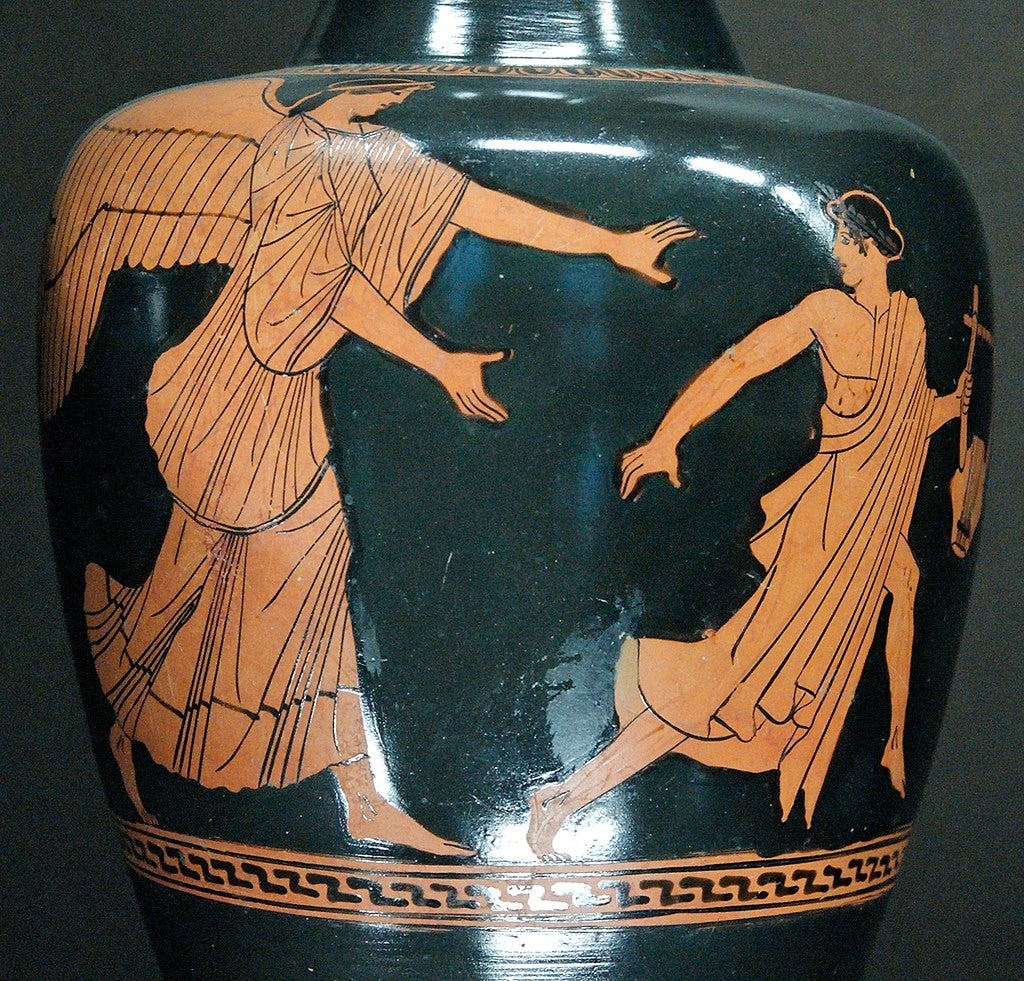

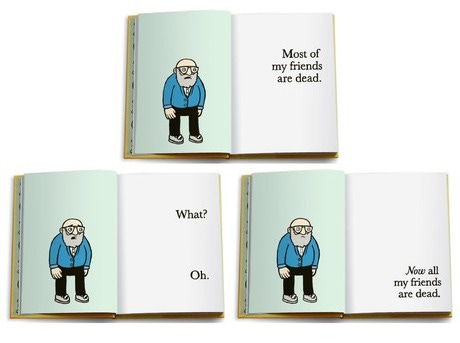

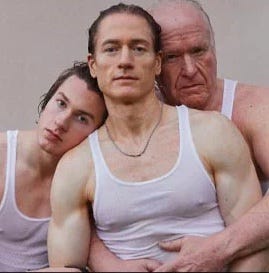

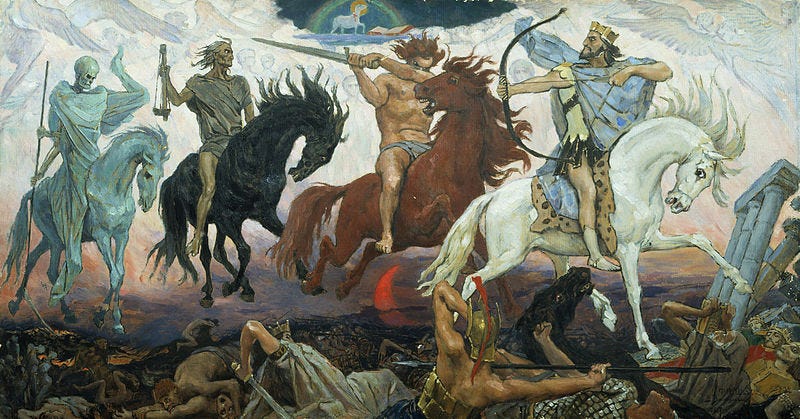
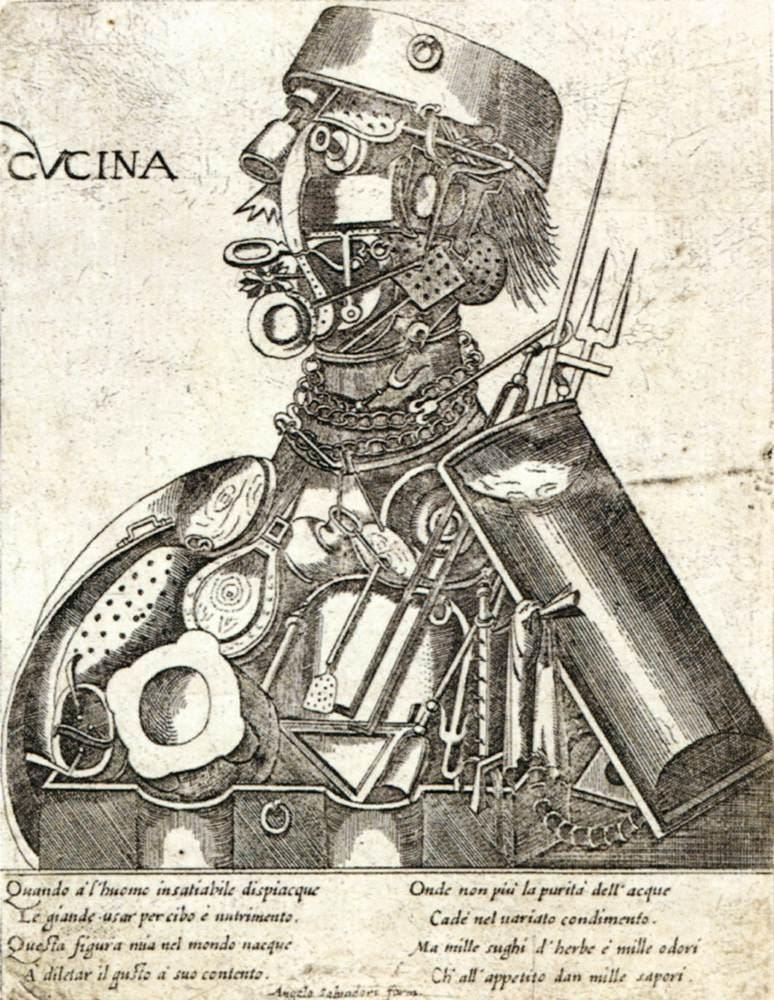


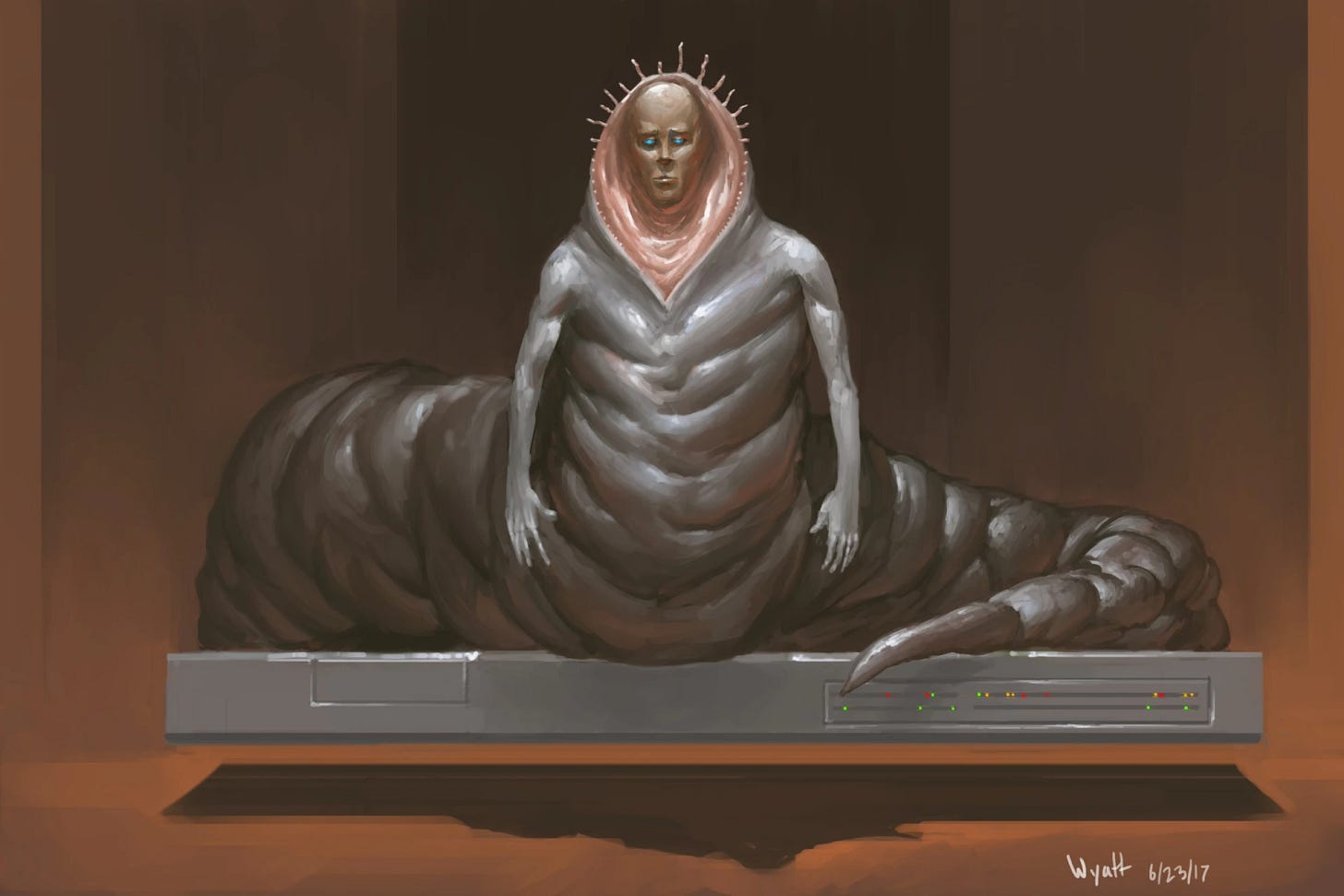






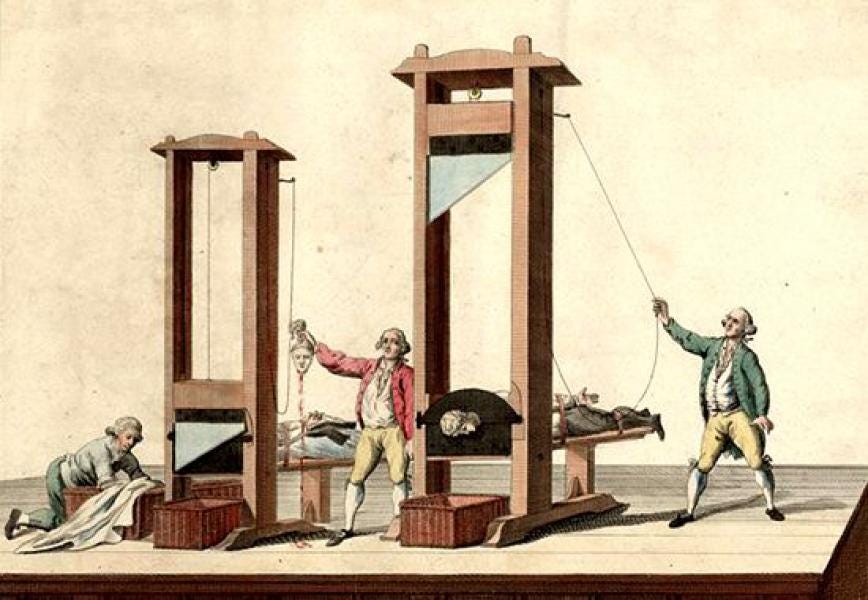
- I respect the coverage of allegories that caution against immortality. I do think they offer insight but they are not definitive insights. Personally, my mind is not made up about immortality, but I generally agree it's not worth pursuing as an end in itself, thus my personal emphasis on "Don't Die" in my essay about Bryan Johnson being a positive message rather than something like "try to live forever," which is not the message he emphasizes.
- The plasma transfer that Bryan, his son, and his father did was a one time thing. Bryan has since admitted that it's not worth repeating and was mostly experimental, though apparently (I have not dug into the details) his father's health did benefit from it. Anyway, your commentary on that is mostly a strawman case.
- aside: His diet is not strictly vegan in the literal sense. He consumes collagen protein, which come from cows.
- In your "undying..." section, I think it is mostly hyperbole, but you again strawman the point about taking "blood" (actually plasma) from others, again, something he did once. Also about this section, Bryan often acknowledges the fact that he will probably die in an ironic manner, as you also allude to, so you're actually on the same page with him there.
- The remainder of your essay is very well done and I actually agree with most of it. You make a lot of solid and insightful points. So, despite the strawman critiques of Bryan Johnson, well done overall.
My favorite parts of this essay are where you point out the likely harms that would occur, such as accumulation of power. The parts at the beginning where you just denounce it as foolish without immediate justification -- I had a hard time following that.